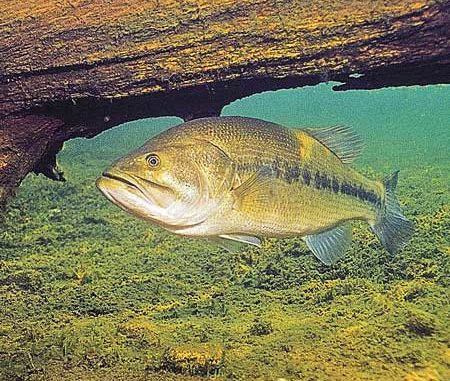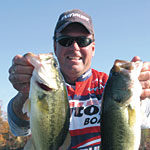
There are a ton of reasons why you ought to try fishing at night during the summer. You can catch bigger fish, it’s not as hot, you don’t have to worry about getting sunburned, but above all, fishing after dark gets you away from all the jet skis and pleasure boats that seem to be filling up our lakes more and more every year.
That’s probably the biggest advantage that night-fishing has over fishing during the daytime: you don’t have to worry about jet skis and skiers and wake boards. It can really be frustrating, especially on the weekends when most people have their only chance to take time to get on the lake and fish.
The second thing that attracted me to night-fishing is being able to catch bigger fish at night than you can during the daytime. When the sun’s up, you’ve got a very small window to catch a quality fish: the first hour after daylight and the last hour before dark. The rest of the time, it’s tough on most of our lakes.
People forget that bass are cold-blooded. Everybody thinks about that in the spring and winter, but in the summer, that affects them just as much. When the water gets that hot, they get sluggish, and they might not feed more than once or twice a day, and most of the time, it will be at night.
I’ve fished a lot of night tournaments over the years, and the difference in the kinds of fish that are caught is tremendous. You fish a daytime tournament during the summer, and you’ll very rarely see a 6-pound fish weighed in. But you fish the same lake, the same day, but after dark, and you’d better have a 6- or a 7- or an 8-pounder if you want to have a chance to win.
And I feel like, If I can go fish for two nights on any of our good lakes in South Carolina — Wateree, Clarks Hill, Murray, Santee Cooper — I’m gonna definitely catch at least one 6-pound fish. I don’t feel that way fishing during the daytime.
If I’ve convinced you to try and fish after dark, we might as well talk about how to catch bass at night.
One thing you’ll have to develop is night vision; some people are born with better night vision than others, but you can develop it. Your eyes will get used to the dark the more time you spend out there. When I’m fishing at night, I try not to look directly into any kind of light — even the running lights on my boat. I don’t use a flashlight. When you’ve been in a boat after dark for about 30 minutes, your eyes will start to adjust and you’ll be able to see a little better.
And really, you do have a little light to go by most nights. If you’re fishing three days before ’til three days after the full moon, you’ll have enough light to see a little, then you’ll find that a lot of the docks and piers on our lakes have some lights, and there will be some street lights that help you a little bit.
I know a lot of fishermen use black lights at night; I don’t have anything against them, I just didn’t ever have them to fish with when I was first fishing at night. I know some fishermen who swear by them, so if you find that your night vision is not really very good, you might try a black light.
The thing you really need to understand about bass is that at night, they feed more by locating their prey through vibrations than sight. On bright nights, they can see some; that’s why you use bigger, darker-colored baits — to give them a better silhouette to see. But they feed more by the vibrations they pick up with their lateral lines.
That’s one of the reasons you hear so much about catching bass at night on topwater plugs. I can remember since I was kid hearing about fishing a Jitterbug at night. Bass will hit topwater baits at night, but they’ll also hit crankbaits and plastic worms and spinnerbaits and jigs. A lot of times instead of starting with a topwater, I might start with a Texas-rigged Senko.
But when you pick your baits, there are two main things to consider. You want to fish bigger baits, and you want to fish darker colors. You’re still trying to make the silhouette that fish sees as big as you can. For colors, we’re talking black, red shad, plum, junebug, black-grape.
I wouldn’t necessarily fish a heavier bait just because it’s bigger. You don’t want to have a bait that falls too fast. If you’re fishing a jig, you might move to a jig with a bigger silhouette, like a Mop Jig, with that bigger, thicker skirt.
Fishing at night is not that much different from fishing the first hour after daylight. When you get on the lake at 10 o’clock at night, you want to go to the same spot where you started at daylight that morning, because the fish you catch in the mornings are the ones that have been on those spots all night — they just haven’t left yet because the sun hasn’t gotten up and the water hasn’t warmed up.
The other thing you need to know is that as the night progresses, fish will move deeper and deeper. You can start fishing around the outside of a dock at 10 o’clock, and the rest of the night, the fish will be moving more and more shallow, as the water temperature drops.
At night, you usually aren’t going to make the really pinpoint casts you can make during daytime hours. You don’t need to just to catch fish. Bass act at night like they act on real cloudy days — they’ll chase a lot more. So you can get away without having to place a bait just perfectly next to a piece of cover.
But if you’re talking about catching a big fish, you’re still going to have to put that bait back where he lives. If you get a bright, moonlit night, or if you’re fishing a series of docks that all have lights on them, you can get up close and flip or pitch to those docks; I like to do that when I’m really looking for a big fish.
And besides beating the heat and the jet skis, a big bass is really what you’re looking for when you fish at night.
Davy Hite is a 44-year-old native of Saluda who lives in Ninety Six. He was the BASS Angler of the Year in 1997 and 2002, and he has won the 1999 Bassmasters Classic and the 1998 FLW Tour Championship. He is sponsored by Triton boats, Evinrude outboards, All-Star rods, Pfleuger reels, Berkley Trilene, Yamamoto Baits, Owner hooks, Humminbird depthfinders and Solar Bat sunglasses.




Be the first to comment